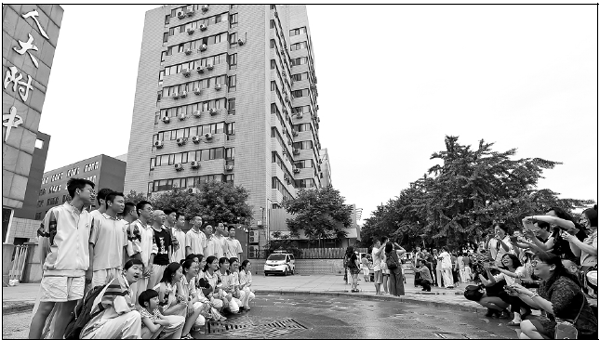IP education thrives among children

Young students inspired by recent lessons to get creative, more aware of innovation
Liu Zilu's homework is always smudged, because he's left-handed. His left wrist smears ink as it rubs on his exercise books when he writes. His parents, who are doctors, appreciate cleanliness and tried to prevent the smears, to no avail.
But the boy found a solution. Liu invented a glove for left-handed writers. Made of elastic gauze and rubber, it has two separate sheaths for the left ring finger and little finger. The glove has concave and convex surfaces, which result in more friction and a smaller contact area with paper, reducing the likelihood of ink stains on the hand.
With the help of his father, Liu, 7, applied for a utility model patent on the glove.
"A patent can protect your ideas and your work, so others cannot easily make the same thing," said Liu, a second-grade student at the Experimental Primary School affiliated with Renmin University of China.
Liu is one of few very young people with a patent, but he is one of a growing number of Chinese students who know what a patent is and how to protect intellectual property rights.
In recent years, the Chinese government has encouraged IP education. In 2015, the National Intellectual Property Administration, together with the Ministry of Education, launched a nationwide pilot demonstration project on IP education in primary and secondary schools across the country.
By the end of 2018, a total of 165 primary and secondary schools had been assessed as IP pilot schools at the national level, 25 as IP demonstration schools and almost 1,000 as IP pilot schools at the provincial level.
A report by the US Center for Intellectual Property Understanding listed China as one of the top seven countries for IP education along with the United States and Japan.
The High School Affiliated to Renmin University of China is one of the IP pilot schools in Beijing where teachers have written textbooks and started dozens of compulsory courses on patents, trademarks and copyrights since 2005.
But they've had difficulty teaching abstract IP concepts, "which are far from students' lives", said teacher He Lingyan. "Few students can understand or remember."
So they changed their methods, raising examples of iPhones and shared bikes, which students are familiar with, explaining the IP concepts involved and studying patent dispute cases.
The new lesson plan seems to be working.
Meng Shi, 12, said he was inspired. He noticed people were reluctant to ride shared bikes on rainy days because the saddles were wet. He designed a waterproof cover for the saddle, controlled by the bike lock through a low-cost mechanism.
With the help of his teacher, Meng applied for a patent for his invention and tried to contact a bike-sharing company to use it.
Many schools organize activities to promote IP knowledge, such as debate competitions, summer camps, visits to science enterprises and moot courts.
While some doubt the necessity of IP education at primary and secondary schools, as IP is mainly a commercial field, Li Zuolin, head of the school's IP teaching group, argues it's "necessary and urgent".
IP education "should be stepped up, starting with teenagers", Li said.
Hua Bing, founder of a Chinese IP information consulting company, found that many people including business executives and researchers, still lack respect for IP rights despite China's progress in the IP field.
"They do not care about infringement or even being infringed, because people of my generation and previous generations grew up with very limited exposure to IP concepts," Hua said. China's patent law was published in 1985, and people a decade or two older are unfamiliar with IP.
"I really think it's necessary to cultivate awareness of IP protection from a young age," Hua said. "When children receive IP education and participate in related activities at school, they may influence their parents at home, which will gradually improve the whole society."
Beyond profit
China has ranked first in the world by number of applications for patents, trademarks and industrial designs for years.
However, some parents have mistakenly used IP as means for their children to earn extra points in the fierce competition to enter top schools.
According to a school teacher, a father working in a research institution made an invention for his child and tried to apply for a patent before the entrance examinations. When the child was enrolled in a leading high school, the family abandoned the application, because it was "useless".
In March, the Ministry of Education announced that patents will no longer be used as items to enhance a student's scoring for university enrollment.
But the policy will not reduce students' enthusiasm, said Gao Ying, a teacher at Beijing No 8 Middle School. Instead, it will enable them to focus more on innovation, rather than "added value".
Wei Hanxiao loves invention. With his high school classmates, he invented a waste recycling device for a 3D printer and applied for a patent.
"It's good training," said Wei, who has received an offer from a prestigious university in Canada to major in electronics and computer engineering. The patent application experience helped him understand the importance of IP protection.
"I will definitely have frequent patent applications in my future career," he said. "Experience in middle school is very helpful."
According to the government, IP education in primary and secondary schools can help cultivate young people's curiosity, train their intelligence and increase their practical abilities.
Gao told her students: "Respect for IP rights first requires respect for knowledge, then for rights." She worries that emphasizing rights first will mislead children to focus too much on profit and neglect the sharing of knowledge.
"The purpose of IP protection is to stimulate desire and energy to create value for society, rather than immediate personal interests," Gao said.
"For children, guiding them to innovate and protect their IP by applying for patents has no commercial concerns, but is just for them to experience 'I have an idea, which needs to be protected, and I have the ability to protect it'."





